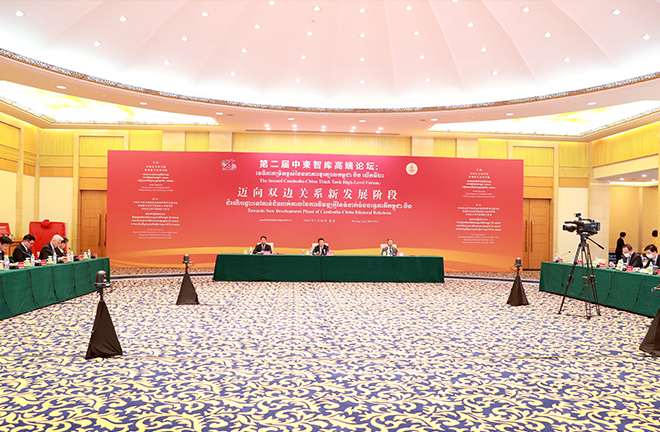Forum eyes advancing China-Cambodia ties

The second Cambodia-China Think Tank High-Level Forum takes place in Beijing on July 28. Photo: Zhu Gaolei/CSST
The second Cambodia-China Think Tank High-Level Forum was convened in Beijing on July 28, under the theme “Towards New Development Phase of Cambodia-China Bilateral Relations.”
Huang Kunming, a member of the Political Bureau of the CPC Central Committee and head of the Publicity Department of the CPC Central Committee, made remarks while delivering a keynote speech via video at the opening ceremony.
Huang said China is willing to work with Cambodia to deepen strategic communication, continue working hand in hand to fight the COVID-19 pandemic, boost economic and trade cooperation, uphold multilateralism, continue to carry forward China-Cambodia traditional friendship, and further promote the building of a China-Cambodia community of shared future.
He also called for close cooperation between think tanks of both countries and strengthening discussions and exchanges.
Cambodia’s Standing Deputy Prime Minister Bin Chhin also addressed the meeting via video.
Jointly hosted by the Chinese Academy of Social Sciences (CASS) and the Royal Academy of Cambodia (RAC), the forum was attended by over 150 people from both countries.
CASS President Xie Fuzhan said that China will continue to support Cambodia in taking a development path that suits its own national conditions. The two sides trust and rely on each other and are firmly moving forward on the road to building a China-Cambodia community of shared future.
Looking to the future, CASS Vice President Wang Linggui suggested that experts from Chinese and Cambodian think tanks continue to jointly produce more and higher-quality research results to better promote the stability and long-term development of the China-Cambodia comprehensive strategic cooperative partnership.
Bilateral trade increasing
China is Cambodia’s largest trading partner. Despite the COVID-19 pandemic, the bilateral trade volume continued to rise, reaching 9.56 billion US dollars in 2020, a year-on-year increase of 1.4%.
In October 2020, China and Cambodia officially signed a free trade agreement. This is the first bilateral free trade agreement ever signed by Cambodia, and the first free trade agreement signed by China since the outbreak of the COVID-19 pandemic.
“Although the global industrial chain and supply chain are facing the threat of obstruction or even broken cycles in the post-pandemic era, China-Cambodia economic and trade cooperation has ushered in new opportunities. These include Lancang-Mekong Cooperation and the construction of a new land-sea corridor. Cross-border e-commerce and the digital economy are developing, and production capacity cooperation is also promising, based on overseas economic and trade cooperation zones,” said Shen Minghui, director of the Emerging Economies Research Office under the National Institute of International Strategy at CASS.
Shen suggested the two sides continue to deepen cooperation in such areas as infrastructure construction and industrial upgrading, under the framework of the Belt and Road initiative.
Chheang Vannarith, president of the Asian Vision Institute in Cambodia, gives special attention to scientific and technological innovation cooperation in the bilateral free trade agreement. He believes that for a small open economy like Cambodia, the elasticity of economic development is crucial, and technological innovation is the key factor in maintaining economic elasticity.
He expressed his hope that Cambodia and China will continue to strengthen top-level design and overall planning and policy guidance, as well as earnestly implement the terms of cooperation in the field of scientific and technological innovation.
Cultural exchange intensified
Cambodia has maintained contacts and exchanges with China throughout history, and Chinese culture has exerted a profound influence on Cambodia, said Phon Kaseka, director of the Institute of Humanities and Social Sciences at RAC.
“The foundation of the China-Cambodia friendship is the people, and the strength also comes from the people,” said Zhang Jinfeng, former Chinese ambassador to Cambodia.
Sombo Manara, a professor at Pannasastra University of Cambodia, said that the historical documents and literary and artistic works of Cambodia and China fully prove that both civilizations are characterized by openness, tolerance, and mutual learning. Humanities exchanges are an important foundation for relations between Cambodia and China.
Zhenla Fengtu Ji (The Customs of Cambodia) is an important work in the history of China-Cambodia cultural exchange. The book was written in the 13th century by Chinese geographer Zhou Daguan, who visited the Angkor capital of Cambodia’s Khmer Empire. As a detailed account of Cambodia’s geography, humanities, politics, and economy at that time, the book is of great historical significance.
In 1971, the book was translated into Khmer by Cambodian scholar Ly Theam Teng. This version is more popular than the other extant Khmer edition.
Gu Jiayun, deputy dean of the School of Asian Studies at Beijing Foreign Studies University, said that while Ly is a great translator, there are still some errors in his translation. This is partly due to the version of the source text that was chosen, and partly due to the translator’s misunderstanding of ancient China’s language and culture.
“The translation of classic works should not stay the same.” Gu said that just as Chinese scholars have been proofreading and restoring the Chinese source text, the Khmer version of the book should also be constantly revised and annotated.
Edited by JIANG HONG
